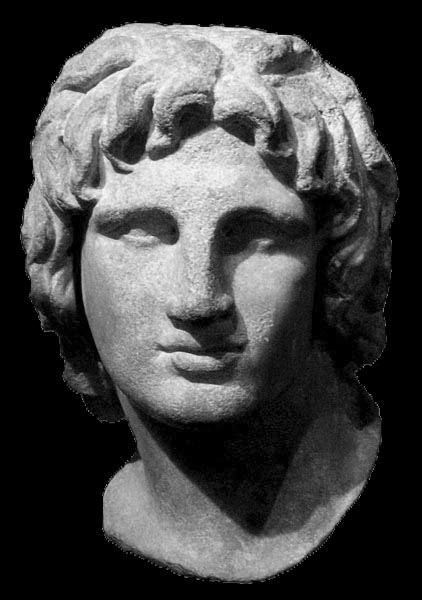Click to see Vol. I, Issue 5 of the newsletter in which this article first appeared.
Listen to the audio of this article!
Though you may not realize it, you have certainly heard of Alexander III of Macedon (356 BCE-323 BCE), but it was probably under his sobriquet: "Alexander the Great."
Much is known of this regional king who came to conquer much of the known world, from Greece to India and modern Pakistan, creating one of the largest empires in the ancient world that included parts of three continents (Europe, Asia, and Africa). But what is not known has been filled in by colorful legends, many of them developed in the Middle Ages.
We know that he was the son of Philip II (whose grave was discovered in recent years). After being tutored until age 16 by the philosopher Aristotle, Alexander became king at age 20, upon his father's death. By age 30 he had completed his conquests, remaining undefeated; legend says that he wept that "there were no more worlds to conquer." (Julius Caesar, in turn, is said to have wept when he saw a statue of Alexander, because Caesar had not matched up to Alexander's achievements.)
Alexander turned back toward Greece only when his troops refused to go any farther, and died at age 32 in Babylon, where he would have established his capital. After his death, the empire rather quickly broke up, but the influence of Greek culture was to last for centuries. For example, although Palestine in the time of Jesus was a Roman colony, the Christian Bible is written in a dialect of Greek--a vestige of Alexander's influence. The style of Greek sculpture can be seen in Buddhist images from central Asia. And Alexandria in Egypt (where Euclid was born) is but one of around 20 cities named for the young conqueror.
Beginning shortly after Alexander's death, a collection of legends began to coalesce, culminating in The Alexander Romance. It was first written down in Greek sometime before 338 CE (long after Alexander's demise), and embroidered through the ages as late as the 16th century in numerous languages, from Greek and Latin through the vernaculars of Western Europe, as well as Slavonic, Hungarian, Arabic, Persian, Ethiopic, Hebrew, Turkish, and even Mongolian. It purported to be a "true" account of Alexander's exploits. In fact, it was just a framework on which was hung a number of traditional tales, some of them based on more genuine works.
The Romance contains, for example, a "first person account" of Alexander's (fictional) meeting with the "King of China." This potentate schooled the young conqueror in the virtue of humility, saying, "If your own luck turns against you, your name and power will perish. Fortune never settles in one place; instead, men make plans and seize countries, but, in the end, everything is taken from us by death. All we have left is a plot of land the size of this cloak," at which he handed Alexander a cloak he had had made, along with jewels and silks.
It's too bad that this vast body of stories is not popular today, like those of King Arthur, or the Germanic sagas popularized by Wagner and Tolkien.
 |
| Aristotle tutors Alexander |
PRACTICE:
Vocabulary: Match the words to their meaning. Correct answers are in the first comment below.
- coalesce
- conquests
- culminating
- empires
- regional
- sculpture
- sobriquet
- troops
- undefeated
- wept
- victories; also, things which have been conquered
- soldiers
- the art of making statues
- cried
- reaching the highest point of development
- nickname
- groups of nations ruled over by one person
- come together; develop into a single thing
- not beaten; having never lost
- of a relatively small area
Questions to Answer: Answer the following questions in your own words. Suggested answers are in the first comment below.
- In what century did Alexander the Great live?
- What did Alexander accomplish?
- Who was Alexander's tutor?
- Why did Alexander decide to turn back toward Greece?
- Does The Alexander Romance give us an accurate biography of Alexander?
Questions to Think About: These questions do not have "right" or "wrong" answers. They only ask your opinion.
- Do you think being taught by a great philosopher helped Alexander be successful?
- Why do you think various legends are often "attached" to famous people like Alexander the Great?
- How would you express the point of the story about Alexander's meeting the "King of China"?



Answers:
ReplyDeleteVocabulary: 1. H; 2. A; 3. E; 4. G; 5. J; 6. C; 7. F; 8. B; 9. I; 10. D
Questions to Answer (suggested answers; yours may be written slightly differently)
1. Alexander the Great lived in the 4th century BCE.
2. Alexander the Great created one of the largest empires in the ancient world, occupying parts of three continents.
3. The famous philosopher Aristotle was Alexander's tutor.
4. Alexander turned back toward Greece because his troops refused to go any farther.
5. No, The Alexander Romance is a collection of stories from many sources, with many later additions including traditional tales.
Questions to Think About do not have any single correct answer. However, any answers you give should be supported by what you read or by things you know ("I think... because...").